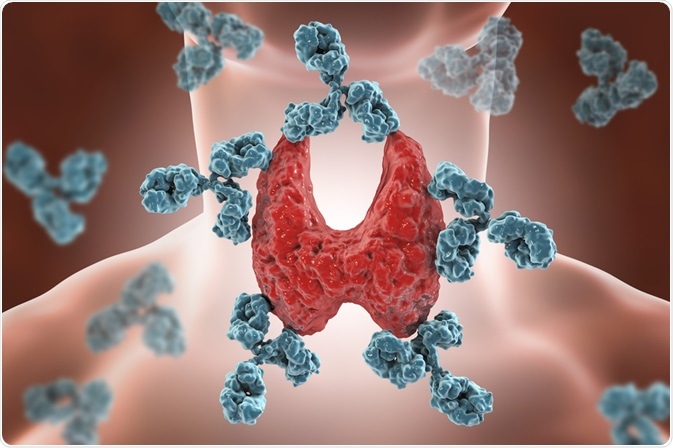Autoimmune diseases
Autoimmune diseases affect between 5-8% of the population, while 78% of those affected by autoimmune diseases are women. It is now generally accepted that the basic immune responses of men and women are different.

Image Credit: Kateryna Kon/Shutterstock.com
For example, women increase antibody production in response to infections, vaccinations, and trauma. On the other hand, men experience more severe inflammation which can be associated with an increased mortality rate.
Antibodies are crucial in the immune response and the protective response from vaccinations. Naturally occurring antibodies are found in the serum of humans and have roles in clearing cell debris as a result of inflammation or physical damage.
On the other hand, autoantibodies can lead to damage through binding to self-antigens therefore, activating the complement cascade. In turn, this can lead to cytotoxicity or various pathologies.
Immune cells can directly damage tissues by killing cells, or indirectly through the production of cytotoxic cytokines, enzymes, and reactive species. Cytokines are released by mast cells, while macrophages can recruit inflammatory cells such as neutrophils and T cells to where the infection is present, or tissue is damaged.
The recruited T cells are classified into subtypes of T- helper (Th) cells depending on the release of interferons or various interleukins (IL). Key examples within autoimmunity feature IL-17 typically involved in organ-specific autoimmune diseases like myocarditis. While both allergic reactions and autoimmune diseases also include IL-17 acting synergistically with TNF-a.
Regulation of inflammation by sex hormones
Sex hormones (progesterone, estrogen, and testosterone) have long been thought to be attributable to the sex differences in the immune response, and in turn, be held accountable for the differences in autoimmunity.
There has been extensive evidence on estrogens and androgens having the ability to influence the immune response directly. Both androgens and estrogens can interact with their receptors present on immune cells.
On a similar basis, cytokine receptors such as IL-1R and IL-18R are also found on tissues that produce hormones; therefore, suggesting the regulation of the immune system could take place in a bi-directional manner.
When considering the role of sex differences, the effect of the sex hormones on target organize and tissues should also be considered. Estrogen and androgen receptors can also be found elsewhere in the body in regions containing, cardiac cells, smooth muscle, and endothelial cells.
Autoimmune cells show a considerable female bias, although evidence examining the effect of estrogen on immune function has often been contradictory. Oestrogen has been demonstrated to stimulate the production of both antibodies and autoantibodies by B cells. Likewise, estrogen has also been associated with an increased level of cytokines IL-4 and IL-10.
Conversely, estrogen has the potential the inhibit TNF-a production from peripheral blood mononuclear cells in men or women under the condition it is administered with lipopolysaccharide.
There has been demonstrably less research into androgens' role in immunity. Several studies have identified androgens to promote the Th1 responses both in humans and rodents. Testosterone has been shown to decrease the cardiac function in a rat heart ischemia model by modulating TNF-a, IL-6, and caspase-1.
However, other animal models have seen androgens reduce the incidence of autoimmune diseases. There is still significant debate regarding the role of androgens in the role of sex-related autoimmunity.
Due to the aromatase conversion activity of testosterone, testosterone can exert its downstream effects through both the androgen and estrogen receptors. Therefore, when measuring the effects of testosterone treatment on immune activity it may difficult to deduce its true effects.

Image Credit: Dean Drobot/Shutterstock.com
Sex differences in autoimmunity
Multiple factors could account for the discrepancies observed in both human and animal models of autoimmunity. Due to the nature of animal studies, it is hard to differentiate between acute and chronic phases of disease.
Subsequently, it may not always be clear about the Th1, Th2, and Th17 responses and how hormones may affect the disease progression. Secondly, the acute and chronic phases may present differently in either sex. Therefore, it is important to model this correctly to ascertain potential effective treatments.
Likewise, the chronic pathology of autoimmune diseases is also less studied relative to their acute counterparts. In such a case, there is little evidence about the role of sex hormones in chronic cases. Within humans, we are exposed to various environmental stimuli and infections throughout our lifetime, which, when compared to animal models may not be accounted for.
On a similar basis, the time in which a person is exposed to an infection in combination with the hormonal status could also alter the pathology of an autoimmune disease.
A last important point to note is the differences observed in rodent models may be attributable to the genetically diverse strains available, which, can, in turn, alter the immune response present.
Concluding remarks
The reasons behind the increased incidence of autoimmune diseases in women remain to be seen. Despite this, studies that have explored the role of Th1 and Th2 in immunopathologies has allowed us to gain a greater understanding of autoimmune diseases.
That said, we have been able to identify the pattern of autoimmune diseases becoming clinically apparent. This has been highlighted in male predominant diseases where they are clinically apparent before aged 50, also displaying features in line with an acute Th1 response.
On the other hand, women have autoimmune diseases that appear later, often with a chronic phenotype and a greater association of autoantibodies.
References
- Jacobson DL, Gange SJ, Rose NR, Graham NMH. Epidemiology and estimated population burden of selected autoimmune disease in the United States. Clin Immunol Immunopathol. 1997;84:223–243.
- Styrt B, Sugarman B. Estrogens and infection. Rev Infect Dis. 1991;13:1139–1150
- Klein SL. The effects of hormones on sex differences in infection: from genes to behavior. Neurosci Biobehav Rev. 2000;24:627–638
- Stockinger B, Veldhoen M, Martin B. Th17 T cells: linking innate and adaptive immunity. Semin Immunol. 2007;19:353–361
- Whitacre CC. Sex differences in autoimmune disease. Nat Immunol. 2001;2:777–780
- Girón-González JA, Moral FJ, Elvira J, Garcia-Gil D, Guerrero F, Gavilan I, Escobar L. Consistent production of a higher Th1: Th2 cytokine ratio by stimulated T cells in men compared with women. Eur J Endocrinol. 2000;143:31–36.
- Martin JT. Sexual dimorphism in immune function: the role of prenatal exposure to androgens and estrogens. Eur J Pharmacol. 2000;405:251–261
Further Reading
Last Updated: Jun 17, 2020